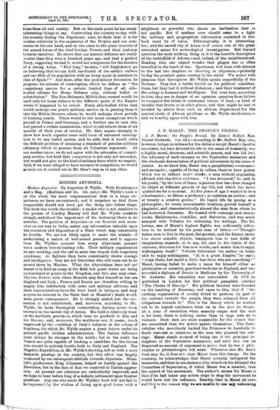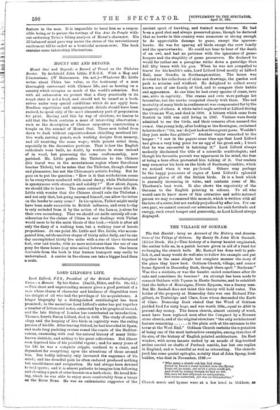J. P. MARAT : THE PEOPLE'S FRIEND.
.T. P. Marat: the People's Friend. By Ernest Belfort Bar. (Grant Richards. lls. 6d.) —According to Mr. Belfort Bax, who, however, brings no witness for the defence except Must's Jacobin associates, his hero devoted his life to the cause of humanity, was a highly moral, decorous, and scientific person, and was led into the advocacy of such excesses as the September massacres and the wholesale denunciation of political adversaries by his sense of justice. As we know him, Marat was a pamphleteer,—veneneous and energetic ; capable of living in cellars, there to brew poison which was to inflame men's minds ; a man without origivality, afflicted with the Wire ambitieux. "I was devoured," he said in his youth, "by the love of fame; a passion that has often changed its object at different periods of my life, but which has never quitted me for a moment. At five years, of age I wanted to be a schoolmaster ; at fifteen a professor; at eighteen an author; and at twenty a creative genius." He began life by. posing as a philosopher ; he wrote interminable treatises, proved himself a plagiarist, and characteristically abased the man from whom he had borrowed, Descartes. He treated with contempt such men as Locke, Malebranche, Condillac, and Helvetins, , and was much annoyed with Voltaire for criticising his writings. , The fol- lowing, one of Marat's highest flights, was sufficiently, ridicu- lous to be noticed by the great man of letters :—" Thought makes man to live in the past, the present, and the future, raises him above sensible objects, transports him to vast fields of imagination, expands, so to say, his eyes to the limits of the universe, discovers for him new worlds, and makes him to enjoy nothingness itself." Voltaire felicitated the author. on .being able to enjoy nothingness.. "It is a great Empire," he says ; " reign there, but insult a little less those who are something!" Marat, having failed to make a name for himself either as philosopher or scientist, practised medicine in England, and was accorded a diploma of Doctor in Medicine by the University of St. Andrews. His versatility was unbounded. In 1774 he published in London his first political pamphlet, entitled "The Chains of Slavery." His political theories were founded on the teaching of Rousseau, and came to this, that if "the existing organisation of society failed to perform its part of the contract towards the people, they were released from all obligations towards it." This is the theory which he worked out to its logical conclusion later on in the Ami die Peuple. At a time of revolution when anarchy reigns and the mob is let loose, there is nothing easier than to urge men on to violence. Such men are more responsible for the crimes that are committed than the active agents themselves. The Sans- culottes who mercilessly hacked the Princess. de Lamballe to death were not so infamous as the men who planned the out- rage. Marat stands accused of being one of the principal in- stigators of the September massacres, and until this can be disproved no amount of argument to prove that he was a phil- osopher or philanthropist will avail. Whatever else Mr. Bax'e book may do, it does not clear Marat from this charge. On the contrary, he acknowledges that Marat actually instigated the massacres, and that in one instance (the attack on the Abbaye) the Committee of Supervision, of which Must was a member, took the control of the movement. The author's excuse for Marat is that if he had taken any active steps to stop the movement he would have lost his influence. Exactly, that is *seat all over. and that is the reason why we are unable to see any redeeming feature in the man. It is impossible to treat him as a respon- sible being, or to peruse the ravings of the Anti du Peuple with- out endorsing Taine's biting analysis of Marat's character. His ill-balanced mind gave way under the stress of the revolutionary excitement till he ended as a homicidal monominiac. The book contains some interesting illustrations.























































 Previous page
Previous page